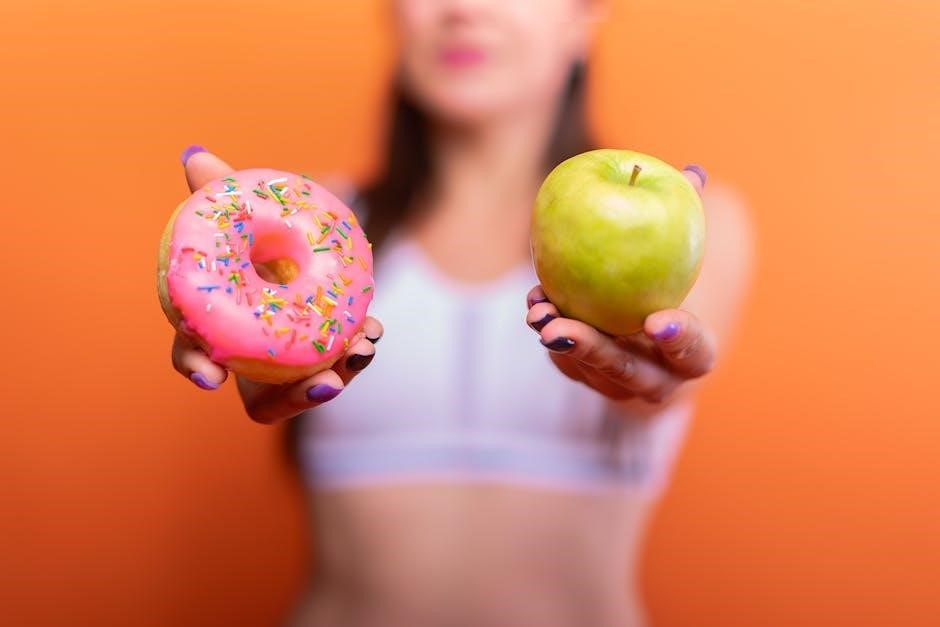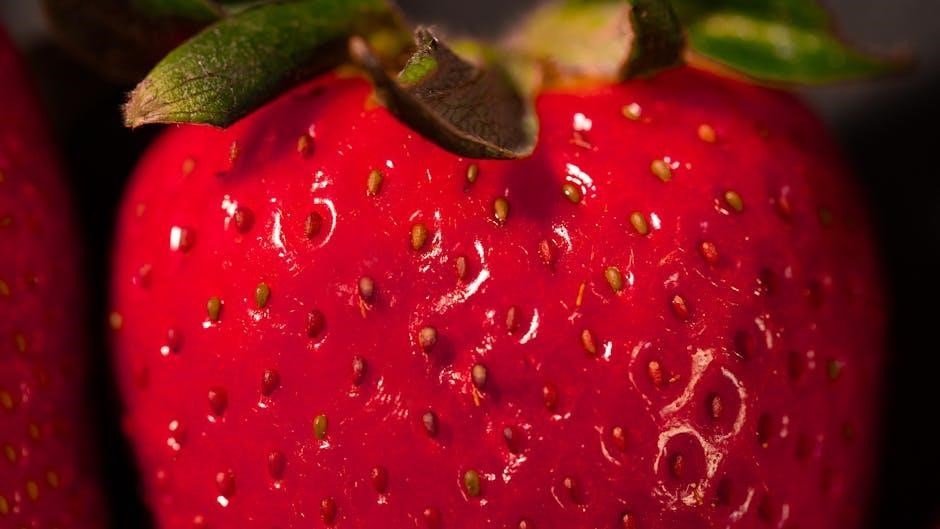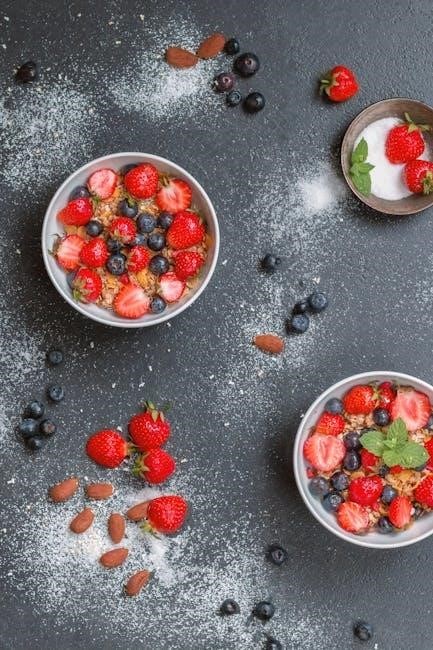
The no sugar diet focuses on eliminating added sugars while allowing natural sugars found in whole foods. It promotes lean proteins, healthy fats, and low-sugar fruits and vegetables. This approach helps reduce sugar intake, improving overall health and energy levels.

The No Sugar Diet Food List
The no sugar diet food list focuses on whole, minimally processed foods. It includes lean proteins, healthy fats, low-sugar fruits, vegetables, whole grains, dairy products, and snacks with no added sugars. This approach helps reduce sugar intake, promoting better health and energy levels naturally.
Lean Proteins

Lean proteins are a cornerstone of the no sugar diet, providing essential nutrients without added sugars. Chicken, turkey, and lean cuts of beef are excellent choices, as they are rich in protein and low in fat. Fish like salmon, cod, and barramundi are also recommended for their high protein content and omega-3 fatty acids. Shellfish, such as shrimp, crab, and lobster, are additional options that fit within the diet’s guidelines. Eggs, tofu, and legumes like lentils and chickpeas are also included, offering plant-based protein sources. These foods help maintain muscle mass, support metabolism, and keep you feeling full longer. When preparing lean proteins, opt for grilling, baking, or stir-frying to avoid adding sugars or unhealthy fats. Incorporating a variety of these proteins ensures a balanced and satisfying diet. By focusing on whole, unprocessed sources, you can enjoy the benefits of lean proteins while adhering to the no sugar diet principles.

Healthy Fats
Healthy fats are a vital component of the no sugar diet, providing sustained energy and supporting overall health. Avocados, nuts, and seeds are excellent sources of monounsaturated and polyunsaturated fats, which are beneficial for heart health. Olive oil, coconut oil, and butter are also included, as they are rich in healthy fats and free from added sugars. Fatty fish like salmon and mackerel are another great option, offering omega-3 fatty acids. Egg yolks and full-fat dairy products, such as unsweetened yogurt and cheese, are also recommended. These fats not only enhance flavor but also help reduce sugar cravings by keeping you feeling fuller longer. When incorporating healthy fats, choose unprocessed and minimally refined options to avoid hidden sugars. Pairing fats with lean proteins and vegetables creates balanced meals that align with the no sugar diet’s principles. By prioritizing these sources, you can enjoy the benefits of healthy fats while maintaining a sugar-free lifestyle.
Low-Sugar Fruits
Low-sugar fruits are a delicious and nutritious addition to the no sugar diet, offering natural sweetness without excessive sugar content. Berries such as strawberries, blueberries, raspberries, and blackberries are excellent choices, as they are rich in antioxidants and fiber. Apples, pears, and citrus fruits like oranges and grapefruits are also recommended, as they provide a sweet flavor with relatively low sugar levels. Apricots, peaches, and kiwis are other good options, offering a balance of sweetness and nutrients. Tropical fruits like mangoes and pineapples can be included in moderation, as they are higher in natural sugars but still beneficial when consumed in limited portions. Acai berries and cherries are also great choices, known for their low sugar content and high nutrient density. When selecting fruits, opt for whole, unprocessed varieties rather than juices or dried fruits, which often have higher sugar concentrations. Incorporating these low-sugar fruits into your diet supports overall health while satisfying your sweet cravings naturally.
Vegetables
Vegetables are a cornerstone of the no sugar diet, providing essential nutrients, fiber, and minimal natural sugars. Leafy greens such as spinach, kale, broccoli, and cauliflower are highly recommended, as they are low in calories and rich in vitamins and minerals. Cruciferous vegetables like Brussels sprouts and asparagus are also excellent choices, offering a good balance of nutrients without added sugars. Colorful options like bell peppers, zucchini, and carrots add variety to meals while keeping sugar content low. Root vegetables such as sweet potatoes and beets can be included in moderation, as they contain natural sugars but are also packed with fiber and antioxidants. Avoid starchy vegetables like corn and peas, which have higher sugar levels. Herbs and non-starchy vegetables like cucumbers, lettuce, and celery are also great additions to salads or snacks. Incorporating a wide variety of vegetables ensures a balanced diet, supports digestion, and helps maintain energy levels throughout the day. By focusing on whole, unprocessed vegetables, you can enjoy their natural flavors and health benefits without worrying about excessive sugar intake.
Whole Grains

Whole grains are a vital component of the no sugar diet, offering a rich source of complex carbohydrates, fiber, and essential nutrients. They are preferred over refined grains because they retain their bran, germ, and endosperm, providing natural fiber and nutrients without added sugars. Oats, quinoa, and brown rice are excellent choices, as they are minimally processed and contain minimal natural sugars. Barley, rye, and whole wheat also fit into this category, offering a nutty flavor and a satisfying texture to meals. When selecting whole grains, opt for unprocessed forms to avoid hidden sugars often found in packaged or flavored varieties. Whole grain bread, pasta, and cereals are also acceptable, but be sure to check labels for added sugars and choose options with fewer ingredients. Incorporating whole grains into your diet supports healthy digestion, provides sustained energy, and helps maintain a balanced meal plan. By focusing on unprocessed, whole grain sources, you can enjoy their natural benefits without compromising your commitment to reducing sugar intake.
Dairy Products
Dairy products are a nutritious addition to a no sugar diet when chosen wisely. Opt for unsweetened, unflavored, and full-fat options to avoid added sugars. Unsweetened yogurt, particularly Greek yogurt, is an excellent choice, as it is high in protein and probiotics, supporting gut health. Cottage cheese is another great option, offering a lean source of protein and minimal natural sugars. Hard cheeses like cheddar, Parmesan, and mozzarella are also ideal, as they contain very low amounts of lactose, making them suitable for a low-sugar diet.
Milk and cream can be included, but it’s best to choose full-fat, unsweetened versions. Eggs, often categorized under dairy, are a perfect sugar-free protein source. When shopping for dairy products, always check labels to ensure there are no added sugars or artificial sweeteners. Flavored or sweetened varieties should be avoided, as they often contain high amounts of sugar. Incorporating these dairy products into your diet provides essential nutrients like calcium, vitamins, and healthy fats while keeping sugar intake minimal. They also add variety and satisfaction to meals, making the no sugar diet more enjoyable and sustainable.
Snacks and Beverages
Snacks and beverages play a crucial role in maintaining energy levels throughout the day while adhering to a no sugar diet. Healthy snack options include unsalted mixed nuts, seeds, and raw or roasted vegetables like carrots, celery, and cucumbers. Fresh or tinned fruit in natural juice (not syrup) is also a great choice, as it provides natural sweetness without added sugars. For beverages, opt for water, herbal teas, or black coffee, which are free from sugars and artificial additives. Unsweetened almond milk or coconut milk can also be included as low-sugar alternatives to traditional dairy.
When selecting snacks, avoid flavored or sweetened versions of nuts, seeds, or yogurt, as they often contain hidden sugars. Instead, pair snacks like hard-boiled eggs or avocado slices with a side of leafy greens for a satisfying and sugar-free treat. For beverages, steer clear of sodas, fruit juices, and sweetened teas or coffees; Incorporating these low-sugar snacks and drinks into your diet ensures you stay nourished and energized without compromising your commitment to reducing sugar intake.





